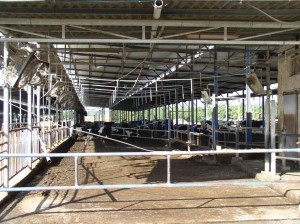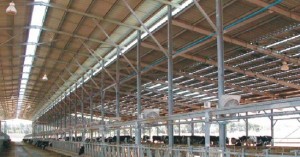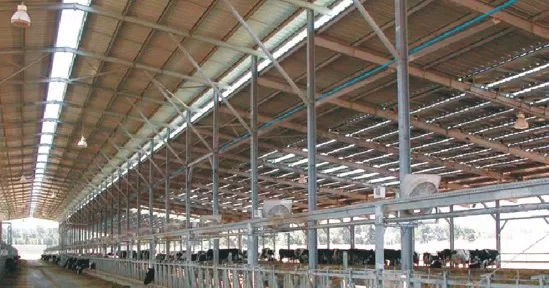Israeli Dairy Farming: How did a country with the least resources and worse climate create the most advanced dairy industry in the world?
5 Facts About the Israeli Dairy Industry
- Israel produces the most milk per cow in the world, both in volume (11,461 kg,/25, 267 pounds) and milk solids (3.29% protein, 3.71% fat)
- The dairy industry has grown 4% per year since the early 90s
- The Israeli Genetic Improvement System developed the Israeli-Holstein breed, creating a cow more fit for the hot, dry climate
- The country milks 130,000 cows in 991 herds
- After a push to improve milk quality, the average SCC fell from 428,000/ml in 1995 to 196,000/ml in 2006
10 Glimpses into Israeli Dairy Farming

1. The early Jewish settlers from Eastern Europe found the native cow to be a poor producer and that the cows they brought with them didn’t adapt to the harsh climate. They developed their own specialized breed by crossing local Damascus and Dutch Friesian cows. After generations of continual crossing they created the Israeli Friesian breed- a cow with the highest milk yield in the world and a remarkable resistance to heat.
2. Most of the country’s dairy farms can be found in one of two forms: the Kibbutzim and the Moshavim. The Kibbutzim are a large collective production entity in which members mutually own means of production and divide among themselves the social and economic responsibilities. The Moshavim is made of individual, private farms organised as a cooperative settlement, but each member runs his own unit. Approximately 62% of cows come from the Kibbutzim.
3. Artificial insemination data is documented on hand held computer terminals by the technician. The information transfers directly to the central herd book. Every proposed mating is entered into the device and is rejected if the inbreeding coefficient is greater than 3.125%. Nearly all cows are bred A.I.
4. Farmers cooperatively own and manage Hachaklait, a veterinary organisation that works closely with the farm. Each farm pays an annual fixed rate per animal and in turn is visited two to three times per week. Each cow receives several routine visits per lactation to ensure she is producing at maximum potential.
5. In order to measure how a farmer deals with climate conditions, a Summer-to-Winter Ratio is given heavy consideration. Based on data from the Milk Recording System, a seasonal average for cows calving in summer and winter are compared. The closer to 100% the ratio is, the more effectively the farmer is handling the effects of heat.
6. Israel farmers experimented with various styles of barns to find the best suited for reducing heat stress. It is now widely accepted that the loose-housing barn is the preferred design. It is a two-sloped roof with a feeding manger in the centre, serving both sides at once. There is a feed alley on each side, and a water trough between the feed alley and bedded area. It is open-roofed, open-ridged, and perpendicular to the prevalent wind direction.

7. Israeli dairy farming takes advantage of intense data collection and analysis. 90% of cows are recorded in the national herd book, and 88% of herds are enrolled in DHIA testing. In general, any cow producing less than 18 litres (41 pounds) a day and not pregnant is culled, ensuring resources are only used on the most efficient producers.
8. Milk is regulated with quota production limits, determined by the Israeli Dairy Board. Quotas are calculated every 6 months and farmers are fined for exceeding their limits.
9. Israeli dairy farming adheres to strict quality standards. Total Bacteria Counts over 75,000 bacterial/ml are penalised, as well as Somatic Cell Counts over 280,000 cells/ml. Premiums are rewarded to milk under 10,000 bacterial/ml and 220,000 SCC.
10. 50% of the land is semi-arid and unsuitable for crops. Wheat is the main forage grown, and accounts for 70-80% of forages used for silage. Because most concentrates have to be imported, by-products are used whenever possible. More than half of the whey produced in the country is fed to dairy animals.
5 Minutes with the Israeli Dairy Board
Israel has pioneered new innovations in the dairy industry, from dealing with heat stress to reducing environmental impact. Have other countries looked to implement technologies or ideas developed in Israel?
Answer: Israel is well known all over the world as a country which is ready to share its knowledge and to spread it. Every year we receive delegations from all over the world – mainly India, China and Africa, who come here to observe the Israeli methods. We also send professionals abroad to teach our methods wherever we are invited. For example, in China and in Vietnam we have built an illustration dairy farms who implement Israeli methods. This is done with governmental help – the Ministry of Foreign Affairs and the Ministry of Agriculture have an agricultural “school” for this very purpose – www.cinadco.moag.gov.il
Speaking of dairy farms, Israeli technology is exported with the help of two big companies – SCR (www.scrdairy.com) and Afimilk (www.afimilk.com).
The Israeli dairy industry operates under a milk quota system. The EU is staunchly phasing out similar regulations, while some in the US are pushing to adopt it. What are the keys to making milk quotas work?
Answer: The key to making any system work is to ensure every partner is gaining from the partnership. The farmers are encouraged to invest in developing sustainable dairy farms with governmental help, and by having “the target price” are reassured about their profit, The dairies are paying a little more for milk but are getting the best quality milk and the full quantity they need, and the Government is able to provide the customers with a very wide selection of dairy products at a low cost.
Israel is like an Island. Since we have very little commercial relations with our neighbours we are responsible of providing all our needs of fresh milk products. Of course, we are exposed to imported products from Europe and to all international agreements.
Has the world collapse of dairy prices reached Israel, or have they been able to avoid the economic crisis suffered by other countries?
Answer: There is no crisis in Israel. Israel is working with the quota system, thus the Israeli farmers are relatively protected. We do have a problem as far as exporting milk powder and butter, but the Israel Dairy Board handles the export for the whole country.
The last ten years alone have seen significant advancements and achievements in the Israeli dairy industry. What goals or areas of production are likely to be addressed in the next ten?
Answer: The next ten years the Israeli Farm will deal with sustainability, as will every farm do anywhere on the globe. Milk quality will not be taken for granted, but we feel the main issue will be – finding the balance among all demands from a modern farm: Environment, animal welfare, energy saving – together with having a high-tech technology and ensuring the best product.
The Milk House sincerely thanks Dr. Tova Avrech for her time.

